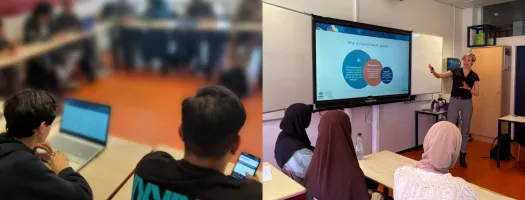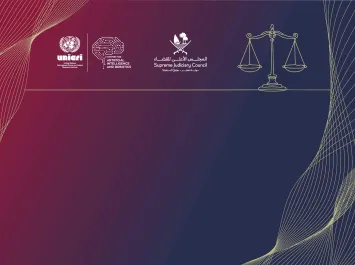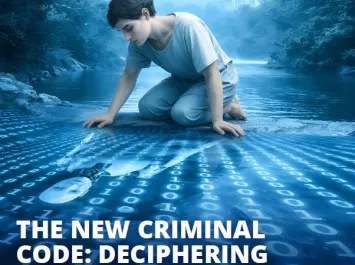On 3 April, under the "AI Literacy for Children: New Skills for a Changing World" project, the United Nations Interregional Crime and Justice Research Institute (UNICRI), through its Centre for Artificial Intelligence (AI) and Robotics, in partnership with Disney Worldwide Services, conducted an AI literacy workshop in The Hague. This workshop brought together 20 students from Rijswijk Lyceum along with their teachers, Ekaterina Reijnen and Chato van der Zwan, who helped organize the workshop, to learn how to use AI – and generative AI in particular – consciously and deliberately.
“For me personally, it was an eye-opener in many aspects,” Ms. Reijnen said. “I will definitely change my approach to their homework from now on. We will speak more openly about the positive role [generative AI] can play in the learning process.”
During the two-hour workshop, students learned the basics of generative AI – a subset of AI used to produce various forms of content based on prompts, including text, images, and audio that resemble human-made content. They participated in an interactive survey and discussion, and explored ways to adapt to the limitations of generative AI in order to leverage its potential to enhance, rather than replace, their own skills. The workshop concluded with an AI image generator activity, allowing students to put theory into practice.
According to both the discussion and preliminary (anonymous) survey results, the students demonstrated a balanced opinion on the potential of generative AI, aligning with current research. They indicated that it can both help with schoolwork and providing information on a topic, but also that relying on generative AI might reduce their own creativity and critical thinking skills.
The rise of chatbots, or AI-powered text generation tools, has raised particular concern among teachers and caregivers about how to prevent students from outsourcing their assignments to these chatbots, thus thwarting the development of their critical thinking skills. Moreover, all types of AI-generated content raise further alarms – especially considering that AI systems and digital spaces are often not designed or regulated for children – about two major risks: the amplification of stereotypes from biased datasets used to train AI systems, and the generation of false or misleading information (commonly referred to as “hallucinations”), by generative AI systems.
To address these main concerns, the AI literacy workshop focused on demystifying the nature of generative AI and being critical of its outputs – in other words, being aware of its potential errors and biases and how to review its outputs and design prompts to produce better results. When concerns are properly addressed, this technology presents numerous advantages in terms of creativity, innovation and productivity, and much of its impact on children is dependent on adult guidance and support. Therefore, in cooperation with the Walt Disney Company, UNICRI aims to continue developing children’s critical thinking skills and their digital literacy to adapt to, rather than fear, this changing digital reality.



